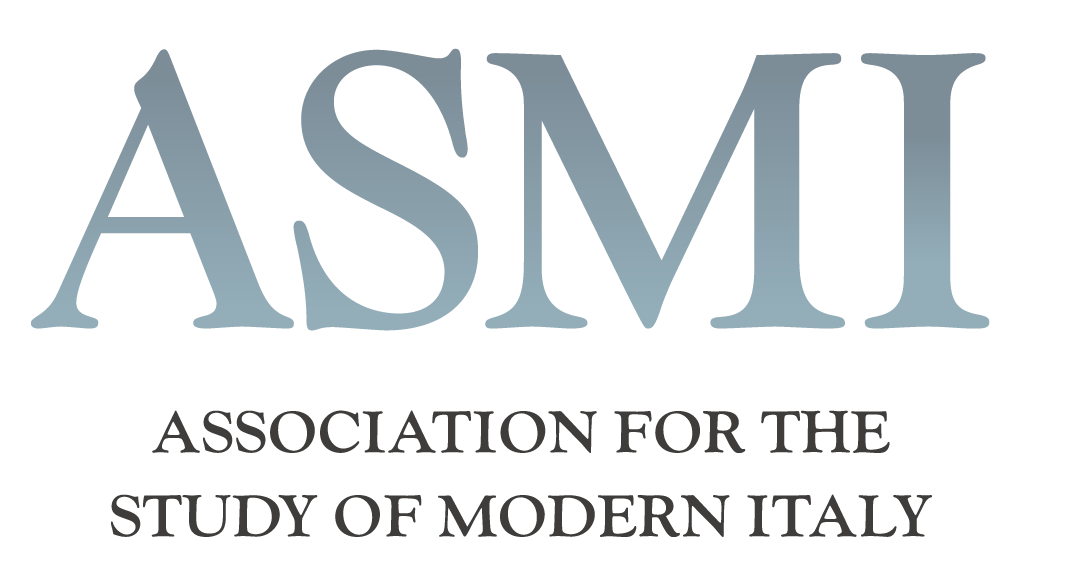ASMI offers a wide range of opportunities for postgraduate students.
Postgraduates
First of all, its conferences and events, such as the Annual International Conference and the annual ASMI Postgraduate Summer School (see below), represent good occasions to develop contacts with scholars and academics working in related fields and to maintain networks with the most important institutions and associations in Italian Studies.
Secondly, ASMI gives postgraduate students advantageous opportunities to be published in the journal Modern Italy.
In addition, the ASMI Postgraduate Essay Prize has been designed specifically for postgraduate students as a means to encourage their research and publish their work.
Finally, ASMI offers the Christopher Duggan Postgraduate Travel Bursaries. Competition for these bursaries, in commemoration of Professor Christopher Duggan, is open to members of ASMI who are either (1) postgraduate students currently registered for a higher degree at a university in the United Kingdom or (2) early career scholars who have completed a PhD within two years of the deadline for application and have no access to other sources of funding. Applicants working in any field covered by ASMI may apply for a sum of up to £500. Awards are made twice a year. The deadlines for submission are 20 January and 20 May.
Please send your application to: [email protected]
ASMI POSTGRADUATE SYMPOSIUM 2020
Virtual: 25-26 November 2020
The 2020 ASMI virtual symposium is designed to offer postgraduate students and early career scholars in the field of Italian Studies a chance to share their research and test their ideas. Participants will present their papers in virtual panel sessions and then receive feedback from senior scholars and junior colleagues in a welcoming and supportive environment. Papers can be in English or Italian and should be no more than 20 minutes in length. All sessions will be recorded and made available to symposium participants.
The symposium includes proposals from postgraduate students and early career scholars for papers on any aspect of Italian history, politics, society, and culture from the eighteenth to the twenty-first century.
ASMI Postgraduate essay prize
The ASMI Postgraduate Essay Prize will be awarded to an outstanding piece of unpublished work by a postgraduate student, dealing with some aspect of modern Italian history, society, or politics in the period between c. 1780 and the present. The work may be an essay, article, or dissertation (entries originating as a chapter of a thesis must be rewritten as freestanding pieces of work). Length: between 5,000 and 8,500 words including footnotes/endnotes and references.
The cash value of the prize will be £300. The prize-winning work will be considered for publication in the Association’s journal Modern Italy, subject to the journal’s normal refereeing procedures. The prize will be presented to the winner during the Association’s Annual Conference in November.
How to enter
The deadline for submissions is 31 July each year. Please send an electronic copy to [email protected]
Eligibility
Applicants should be currently registered for a postgraduate degree or have completed a postgraduate degree not more than twelve months before the closing date for this competition. Non-graduate work is not eligible. ASMI welcomes applications from all over the world.
All applicants should be members of ASMI. To join ASMI, see our membership page.
Submissions should be written in either English or Italian, and must not currently be under consideration for publication. Work that exceeds the word limits stated above will not be accepted.
For any queries please contact us.
Prize roll of honour
2021 – Beatrice Falcucci (Florence).
Museologia europea e concordia coloniale: l’Italia all’Expo du Sahara di Parigi del 1934 and Francesca Campani (Padua/Lincoln). Exciting Reads. Romantic Love and Female Readers of Mantegazza’s Sexual Science.
2020 – Gianmarco Mancosu (Warwick).
Amnesia, aphasia and amnesty: the articulations of Italian colonial memory in postwar films (1946-1960).
2019 – Maria Stella Chiaruttini (European University Institute, Florence).
‘An economic monument of that part of the common fatherland … most dear to me’: The Bank of Naples and the struggle for regional power in Risorgimento Italy.
2018 – Caterina Scalvedi (University of Illinois at Chicago).
Catholic Missionaries in Italian Somalia: Baptism, Education, and the ‘problem’ of Meticci (1924-1930).
2017 – Sarah Culhane (University of Bristol).
Locating the audience within the pages of a fan magazine: the audience-star relation as told through Hollywood (1945–1953), and Glauco Schettini (Fordham University) Building the Third Rome: The New District in Prati di Castello, 1870–95.
2016 – Diego Gavini (University of Rome; Tor Vergata).
La memoria dei morti e la costruzione di una nuova “religione civile”:uno studio dei funerali delle vittime di mafia (1963-2012)
2015 – Emma Barron (University of Sydney; University of Bologna)
2014 – Patrick McGauley (UCL)
2013 – Hannah Malone (University of Cambridge)
2012 – Jennifer Griffiths (Byn Mawr)
2011 – Natalie Fullwood (University of Cambridge)
Commedia all’italiana, the media and the economic miracle: mediating change
2010 – Andrea Hajek (University of Warwick)
Francesco è vivo, e lotta insieme a noi. Rebuilding Local Identities in the Aftermath of the 1977 Students Protests in Bologna
2009 – Chris Hanretty (European University Institute at Florence, Italy)
The concept of pluralism in Italian public media
2008 (joint winner) – Marcella Pellegrino Sutcliffe (University of Newcastle, UK)
Negotiating the ‘Garibaldi moment’ in Newcastle-upon-Tyne (1854-1861)
2008 (joint winner) – Nir Arielli
The optimistic summer, June-October 1940
2007 (joint winner) – Lena Näre (University of Sussex, UK)
The Making of “Proper” Homes – Everyday Practices in Migrant Domestic Work in Naples
2007 (joint winner) – Alessandra Antola (Royal Holloway, University of London, UK)
Ghitta Carell and Italian studio photography in the 1930s
2006 (joint winner) – Niamh Cullen (University College Dublin, Republic of Ireland)
2006 (joint winner) – Kyle Liston (Indiana University-Bloomington, USA)
2005 – No prize awarded
2004 – Paul Garfinkel (University of Harvard, USA)
Quantifying backwardness: statisticians, criminologists and Italy’s “sad primacy” in the South
2003 – Duncan McDonnell (University of York, UK)
Subnational politics in Genoa: new wine in old bottles?
